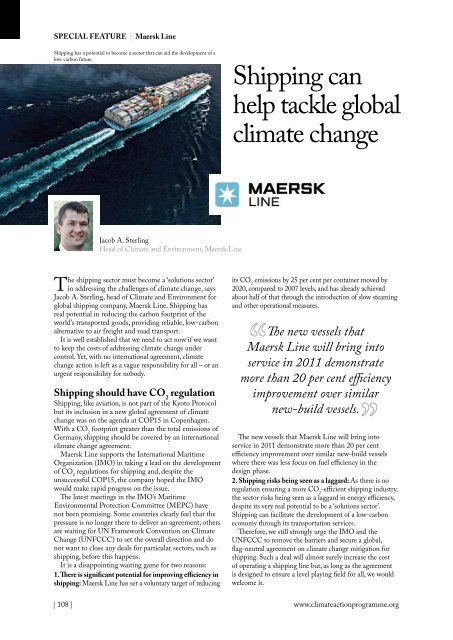Climate Action 2010-2011
You also want an ePaper? Increase the reach of your titles
YUMPU automatically turns print PDFs into web optimized ePapers that Google loves.
SPECIAL FEATURE | Maersk Line<br />
Shipping has a potential to become a sector that can aid the development of a<br />
low-carbon future.<br />
Shipping can<br />
help tackle global<br />
climate change<br />
Jacob A. Sterling<br />
Head of <strong>Climate</strong> and Environment, Maersk Line<br />
The shipping sector must become a ‘solutions sector’<br />
in addressing the challenges of climate change, says<br />
Jacob A. Sterling, head of <strong>Climate</strong> and Environment for<br />
global shipping company, Maersk Line. Shipping has<br />
real potential in reducing the carbon footprint of the<br />
world’s transported goods, providing reliable, low-carbon<br />
alternative to air freight and road transport.<br />
It is well established that we need to act now if we want<br />
to keep the costs of addressing climate change under<br />
control. Yet, with no international agreement, climate<br />
change action is left as a vague responsibility for all – or an<br />
urgent responsibility for nobody.<br />
Shipping should have CO 2<br />
regulation<br />
Shipping, like aviation, is not part of the Kyoto Protocol<br />
but its inclusion in a new global agreement of climate<br />
change was on the agenda at COP15 in Copenhagen.<br />
With a CO 2<br />
footprint greater than the total emissions of<br />
Germany, shipping should be covered by an international<br />
climate change agreement.<br />
Maersk Line supports the International Maritime<br />
Organization (IMO) in taking a lead on the development<br />
of CO 2<br />
regulations for shipping and, despite the<br />
unsuccessful COP15, the company hoped the IMO<br />
would make rapid progress on the issue.<br />
The latest meetings in the IMO’s Maritime<br />
Environmental Protection Committee (MEPC) have<br />
not been promising. Some countries clearly feel that the<br />
pressure is no longer there to deliver an agreement, others<br />
are waiting for UN Framework Convention on <strong>Climate</strong><br />
Change (UNFCCC) to set the overall direction and do<br />
not want to close any deals for particular sectors, such as<br />
shipping, before this happens.<br />
It is a disappointing waiting game for two reasons:<br />
1. There is significant potential for improving efficiency in<br />
shipping: Maersk Line has set a voluntary target of reducing<br />
| 108 |<br />
its CO 2<br />
emissions by 25 per cent per container moved by<br />
2020, compared to 2007 levels, and has already achieved<br />
about half of that through the introduction of slow steaming<br />
and other operational measures.<br />
The new vessels that<br />
Maersk Line will bring into<br />
service in <strong>2011</strong> demonstrate<br />
more than 20 per cent efficiency<br />
improvement over similar<br />
new-build vessels.<br />
The new vessels that Maersk Line will bring into<br />
service in <strong>2011</strong> demonstrate more than 20 per cent<br />
efficiency improvement over similar new-build vessels<br />
where there was less focus on fuel efficiency in the<br />
design phase.<br />
2. Shipping risks being seen as a laggard: As there is no<br />
regulation ensuring a more CO 2<br />
-efficient shipping industry,<br />
the sector risks being seen as a laggard in energy efficiency,<br />
despite its very real potential to be a ‘solutions sector’.<br />
Shipping can facilitate the development of a low-carbon<br />
economy through its transportation services.<br />
Therefore, we still strongly urge the IMO and the<br />
UNFCCC to remove the barriers and secure a global,<br />
flag-neutral agreement on climate change mitigation for<br />
shipping. Such a deal will almost surely increase the cost<br />
of operating a shipping line but, as long as the agreement<br />
is designed to ensure a level playing field for all, we would<br />
welcome it.<br />
www.climateactionprogramme.org












